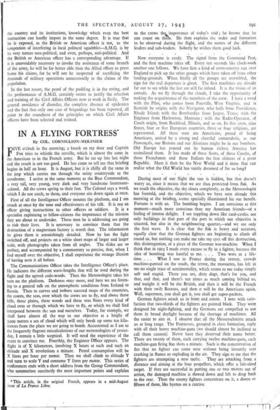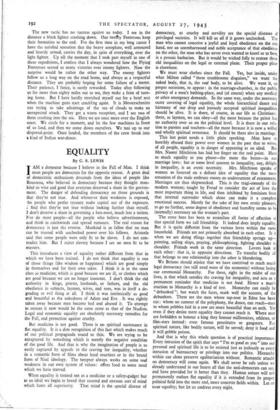IN A FLYING FORTRESS*
By COL. CORNIGLION-MOLINIER
FIVE o'clock in the morning; a knock on my door and Captain Fox tries to whistle the reveille, which is almost the same in the American as in the French army. But he sat up late last night and the result is not too good. He has come to tell me that briefing begins in half an hour. It is August, but it is chilly all the same in the jeep which carries me through' the misty countryside to the aerodrome. I arrive at the same moment as the Base Commandant, a very tall, very young, very dark and very handsome lieutenant- colonel. All the crews spring to their feet. The Colonel says a word, which I do not catch, to them, and everyone sits down again at once.
First of all the Intelligence Officer mounts the platform, and I am struck at once 'by the tone and effectiveness of his talk. It is not an officer giving instructions to other officers or soldiers. It is a specialist explaining to fellow-citizens the importance of the mission they are about to undertake. These men he is addressing are going to risk their lives. It is necessary to convince them that the destruction of a magnesium factory is worth that. The information he gives them is astonishingly detailed. Now he has the light switched off, and projects on a white sheet maps of larger and larger scale, with photographs taken from all angles. The slides are so perfect, and accompanied by a commentary so precise, that, when I find myself over the objective, I shall experience the strange illusion of having seen it all before.
The Communications Officer takes the Intelligence Officer's place. He indicates the different wave-lengths that will be used during the flight and the agreed code-words. Then the Meteorologist takes his turn on the platform. Darkness once more, and here we are listen- ing to a general talk on the atmospheric conditions from Iceland to Russia. Then to curves and isobars succeed maps of the countries, the coasts, the seas, over which the crews are to fly, and abOve these hills, these plains, these woods and these seas floats every kind of cloud over or through which we have to fly, or which we shall find interposed between the sun and ourselves. Today, for example, we shall have almost all the way to our objective at a height of 3,000 metres a sea of cloud which will only break up some ten kilo- metres from the place we are going to bomb. Accustomed as I am to the frequently flagrant miscalculations of our meteorologists of yester- day, I remain a little sceptical. It will need the experience of the event to convince me. Fourthly, the Engineer Officer appears. The flight is of X kilometres, involving X hours at such and such an altitude and X revolutions a Minute. Petrol consumption will be X litres per hour per motor. Then we shall climb to altitude Y and turn to scale Y and consume Y litres per motor. This series of conferences ends with a short address from the Group Commandant, who summarises succinctly the most important points and explains * This article, in the original French, appears in a mid-August issue of La France Libre. to the crews thei,importance of today's raid ; he knows that he can count on that. He then explains the order and formation to be observed during the flight, and ' the names of the different leaders and sub-leaders. Soberly he wishes them good luck.
Now everyone is ready. The signal from the Command Post, and the first machine takes off. Every ten seconds like clock-work another one follows. We have first a kind of cross-country run over England to pick up the other groups which have taken off from other landing-grounds. When finally all the groups are assembled, the sign for the real departure is given. The first machines are already far out to sea while the last are still far inland. It is the vision of an armada. As we fly through the clouds, I take the opportunity of making the acquaintance of the members of the crew. I have a word with the Pilot, who comes from Pineville, West Virginia, and is Scottish by origin; with the Navigator, who hails from Providence, Rhode Island; with the Bombardier from Jasper, Texas; with the Engineer from Harlowton, Montana ; with the Radio-Operator, of Czech origin, from Rockford, Illinois, and so on. In this crew, nine States, four or five European countries, three or four religions, are represented. All these men are Americans, proud of being Americans, united by a strong and cheerful camaraderie, as our Provencals, our Bretons and our Alsatians might be in our bombers. Old Europe has poured out its human riches; America has assimilated them. It has made of these Scots, of these Czechs, of these Frenchmen and these Italians the free citizens of a great Republic. Must it then be the New World and it alone that can realise what the Old World has vainly dreamed of for so long?
During most of our flight the sun is hidden, but that doesn't worry us, since it means that we are thus protected from flak. As we reach the objective, the sky clears completely, as the Meteorologist has foretold, and the objective, which we have seen already this morning at the briefing, seems specially illuminated for our benefit. Fortune is with us. The bombing begins. I am conscious at this moment—much more conscious than my American friends—of a feeling of intense delight. I see toppling down like card-castles not only buildings in that part of the port in which our objective is situated, but also in the neighbouring quarter,—and we are only the first wave. It is clear that the flak is heavy and accurate, equally clear that the German fighters are beginning to climb all round us, but nothing can make me take my eyes off this destruction, this disintegration, of a piece of the German war-machine. When I think that in 1955 I made every excuse to fly in a fighter, because the idea of bombing was hateful to me. . . . Two wars in a life- time. . . . What I saw in France during the retreat, crowds machine-gunned on the roads, the terror, the massacres, has left in me no single trace of sentimentality, which seems to me today simply soft and stupid. There you are, dirty dogs, that's for you, and that, and that, and there's ten times as much coming behind us, and tonight it will be the British, and then it will be the French with their swift Bostons, and then it will be the Americans again. Well, supermen, you shall get it, you shall get super-packets.
German fighters attack us in front and astern. I note with satis- faction that two-thirds of the fighters are painted black. They were designed for night-fighting, and the Germans are compelled to use them in broad daylight because of the shortage of machines. All the easier to aim at. I observe that all the Messerschmitts attack us at long range. The Fortresses, grouped in close formation, reply with all their heavy machine-guns (we should almost be inclined to call them cannon). Never have they deserved their name better. There are twenty of them, each carrying twelve machine-guns, each machine-gun firing 80o shots a minute. Such is the concentration of fire that no fighter can come near without being instantly sent crashing in flames or exploding in the air. They sign to me that the fighters are attempting a new tactic. They are attacking from a distance and aiming at the four propellers, which offer a fair-sized target. If they are successful in putting one or two motors out of action, the damaged machine is slowed down and left to drop back to the rear. Then the enemy fighters concentrate on it, a dozen or fifteen of them, like hyenas on a carcase. The new tactic has no success against us today. I see in the distance a black fighter crashing down. Our twenty Fortresses keep their formation to the end. For the first time in my long career I have the satisfied sensation that the heavy aeroplane, well armoured and heavily armed, carries the day, in spite of everything, over the light fighter. Up till the moment that I took part myself in one of these expeditions, I confess that I always wondered how the Flying Fortresses scored so many victories over 'enemy fighters. Now the surprise would be rather the other way. The enemy fighters follow us a long way on the road home, and always at a respectful distance. They are probably hoping for some failure of a motor. Their patience, I fancy, is rarely rewarded. Today after following us for more than eighty miles out to sea, they make a feint of turn- ing home. But I have hardly stretched myself out for a brief rest when the machine guns start crackling again. It is Messerschmitts hie) trying to take advantage of the sea of clouds to make an unexpected attack. They get a warm reception, and I see two of them crashing into the sea. Here we are once more over the English coast. We circle for a moment, and let the few machines in front of us land, and then we come down ourselves. We taxi up to our dispersal-point. Once landed, the members of the crew break into a kind of Indian war-dance.























 Previous page
Previous page